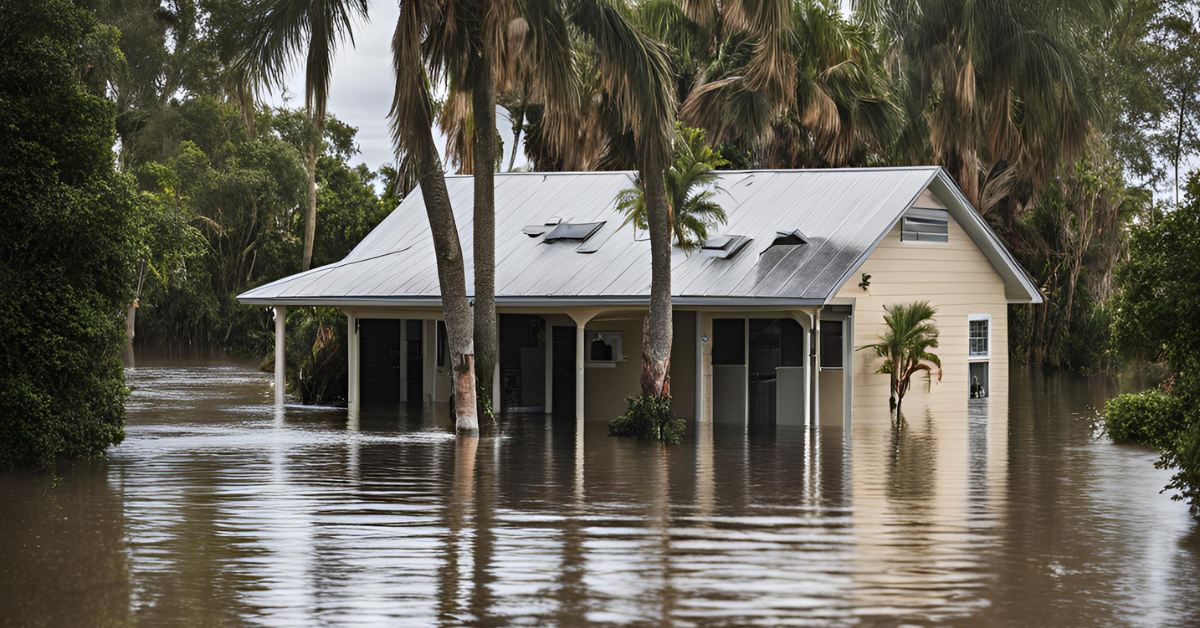
I understand these are difficult times, with many of us facing the heartbreaking loss of our homes. I’ve personally been affected —my home in Shore Acres was flooded with over three feet of water during Hurricane Helene, just 12 months after I had renovated it after flooding with Hurricane Idalia. I empathize with what so many of you are going through, this week has been one of the hardest of my life. It’s not about the loss of “stuff”, it’s about the loss of the feeling of home. It’s about priceless family photos being ruined that can’t be replaced. It’s devastating and I am so sorry for anyone who is sadly in the same boat.
My house, flooded by Hurricane Helene with over 3 feet of water.
Recently, several people have reached out to ask about their options for selling their homes in the aftermath of the storm. Some have experienced multiple flooding events over the past couple of years, while others are dealing with their first flood due to Helene. Some of us (me included) love our community but just feel we cannot go through flooding again or we’ll wind up in a mental institution. So then what?
Can you sell your home without making repairs? The answer is yes. That’s actually what I am personally going to attempt to do. You can accept your insurance payout, sell the property as-is, and pay off any existing mortgages. If you’re considering this route, make sure to consult with your lender and insurance company to ensure compliance with your loan and insurance terms. Be certain that your claim is filed before proceeding. Many investors are interested in buying properties as-is. They’ll either renovate and resell, or tear the home down and build new construction that meets current elevation codes. Based on recent discussions with investors, non-waterfront lots are being valued around $250-270K, while waterfront properties may vary based on several factors. For more accurate pricing, contact a local real estate professional.
Now, what if you bought your home in the past few years and owe more on your mortgage than the property’s current value? This is where short selling comes into play. A short sale occurs when you owe more than the property is worth, and you request that the bank forgive the difference. While it can affect your credit, this process is still a better alternative to foreclosure. Having managed several short sales between 2007 and 2011, I’m familiar with the process, should this be a necessary option.
Another question I’ve been asked is: “If I renovate my home and put it on the market, will anyone buy it? Does it still hold any value?” In my professional opinion, if your home is a single-story property built on a slab, with less than nine feet of elevation in an area like Shore Acres, its value lies more in the land than in the structure itself. This conclusion is based on recent data: homes listed post-Idalia have struggled to sell, and many prospective buyers have expressed concerns about purchasing non-elevated, flood-prone properties.
In many cases, the best use of these properties may be to elevate the home, which can cost around $300,000, or to demolish and rebuild to current code, with construction costs estimated at $300-450 per square foot.
Some believe Idalia was a once-in-30-year event, and Helene a once-in-100-year storm, and love where they live and will rebuild and stay. If you choose to rebuild, I support you. I love Shore Acres and our surrounding waterfront and beach communities and it breaks my heart to sell myself.
However, for those considering renovation and selling later 4 to 6 months down the road, it’s possible that the market will be saturated with listings, much like we’ve seen post-Idalia.
There are also people who didn’t flood during any of the recent storms who just want out of a high risk flood zone. These are a bit trickier to put a market value on, so rely on your Realtor to check surrounding homes sales that did not flood to get an accurate value.
Now – that said – if you want to just sell as is to an investor – be wary of some of these contracts which are sneaky and seek to steal your equity. ALWAYS have a licensed real estate agent or attorney check the contract before you sign – because once signed, it’s legally binding.
One type of investor is a wholesaler who makes the contract assignable. They will then flip the property at closing to another end buyer for a higher number and pocket the difference (YOUR EQUITY!). A dead giveaway is an assignable contract.
The other big red flag is called “Subject To”. In a Subject To they will often throw a number at the seller that is well over market value, but the contract states they will pay you a down payment and continue to pay your mortgage. The risk is if the buyer does not make the mortgage payments, the sellers mortgage company can foreclose on the property. If made aware that the seller has sold the property, the seller’s mortgage company may also exercise the “Due on Sale” clause and call the mortgage immediately due in full.
If you decide to sell as-is, you want to ask for cash, no assignable contract, no subject to – and let your agent or attorney read it over before you sign.
The choice is ultimately dependent on your goals but I’m here if you need a sounding board.







